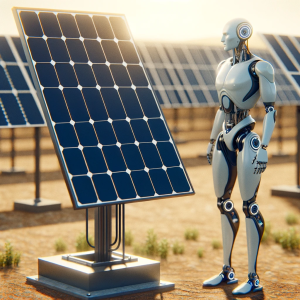
The Role of Artificial Intelligence in Enhancing Solar Power Systems
Solar power systems play a vital role in the search for renewable energy systems as they convert sunlight into electricity. These systems have also seen the explosion of Artificial Intelligence (AI) as the key driver of change in the way these systems operate in the recent past mainly in terms of efficiency, reliability, and costs. Solar power systems have taken the central stage in the search for renewable energy sources to meet the world’s power needs through the conversion of sunlight into power. Presently, AI has become a significant innovation in the improvement of these systems, their effectiveness, dependability, and affordability.
AI is a critical application of technology in improving the efficiency of solar panels by using algorithms to control the position and angle of the panels. These algorithms work with data received from sunlight intensity and the angle of the panels and keep adjusting the position of the panels to capture the most energy. Not only does this capability increase energy production but it also increases the longevity of the solar panels as it reduces the amount of wear and tear caused by less than ideal conditions.
Another area where AI proves to be very useful is in predictive maintenance which is another way through which the management of solar arrays has been transformed. Using big data, AI systems can learn when a piece of equipment is likely to fail and make recommendations for maintenance accordingly. This prevents damage to the system and reduces the frequency of repairs which are important aspects that determine the sustainability of solar projects.
Additionally, AI-based predictive analysis improves energy yield forecasting which is important for grid integration. With the help of the data of past weather conditions and using real-time data AI can predict the generation of power using solar with high precision. It assists in maintaining stability of the grid through demand side management, supply side management as well as managing fluctuations arising from renewable energy sources.
From the cost perspective, AI technologies are characterized by considerable savings across the solar power system’s life cycle. Starting with the initial design and installation and reaching up to the maintenance and energy management costs, AI plays a vital role in the further lowering of the costs of solar energy.
In the future, more functions of AI are expected to be added to solar power systems. Further evolution of AI technologies will bring even better effectiveness and new solutions, which is why renewable sources of energy will remain the foundation for future energy systems. Given that AI is gradually being implemented into renewable energy sectors, the chances are high that renewable energy solutions that are sustainable and efficient would be achievable.
In conclusion, therefore, one can conclude that Artificial Intelligence is not just improving solar power systems, but instead, is completely transforming them. The use of AI in solar energy is vast and ranges from enhancing efficiency, predicting the time of maintenance, increasing the amount of energy collected, and decreasing the costs that are incurred. Adopting AI technologies will be imperative in the shift to green energy systems across the globe.
